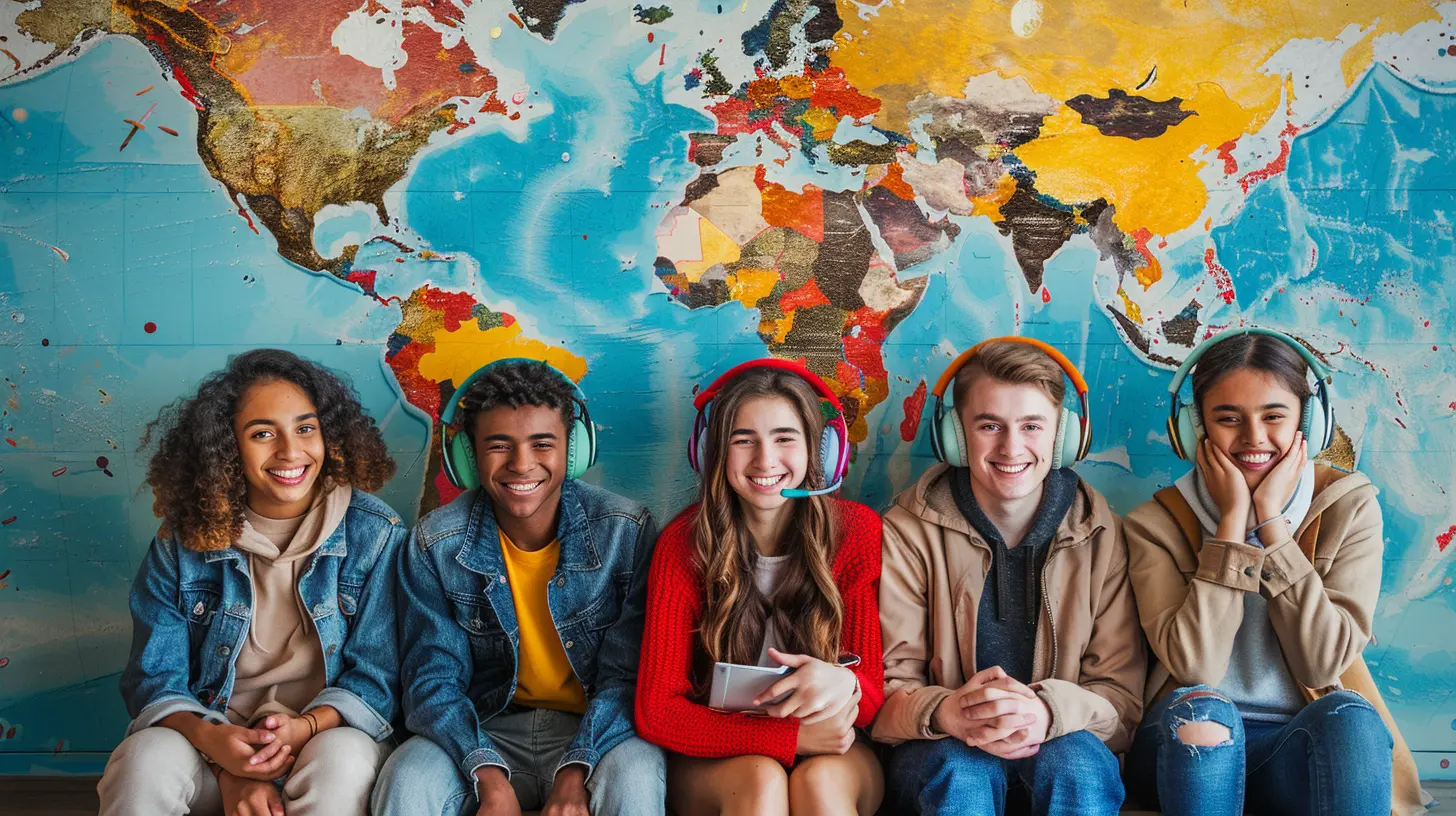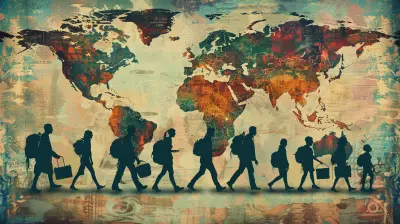The Role of Language in Making the Most of Your Student Exchange Program
22 December 2024
Imagine this: You’ve just landed in a foreign country, your suitcase is packed with excitement and nerves, and you’re ready to embark on the adventure of a lifetime—your student exchange program. You can already picture yourself making new friends, exploring unfamiliar cities, and soaking up a new culture like a sponge. But wait, there’s an invisible bridge you’ll need to cross before you can truly dive into this experience. That bridge? Language.
Language is the key to unlocking the full potential of your student exchange program. It’s more than just words and grammar; it’s your gateway to cultural immersion, meaningful connections, and academic success. The better you understand and use the local language, the richer your experience will be.
In this article, we’ll dive deep into the role of language in shaping your student exchange experience. Whether you’re fluent in the host country’s language or just starting out, understanding how language can impact your journey will help you make the most of this once-in-a-lifetime opportunity.

Why Language Matters in a Student Exchange Program
Communication Is Everything
Let’s face it—communication is the backbone of any relationship, especially when you’re in a foreign country. From ordering food at a local café to understanding your professor’s lecture, language is your primary tool for navigating daily life.Think about how much you rely on language in your home country. Now imagine doing all those things—making friends, asking for directions, even buying groceries—in a language that’s not your first. Sounds challenging, right? That’s why learning the local language, even just the basics, can make a world of difference.
When you can communicate effectively, you not only meet your daily needs but also open the door to deeper, more meaningful interactions. Suddenly, you’re not just a tourist; you’re part of the community. You can engage in conversations, share stories, and build relationships that go beyond surface-level pleasantries. And that, my friend, is the essence of a successful student exchange program.
Language as a Cultural Key
Language and culture are like two sides of the same coin. When you learn a new language, you’re not just memorizing vocabulary and grammar rules—you’re also gaining insight into the culture of the people who speak it.Think about idioms, slang, and even the way people greet each other. These little nuances reveal so much about a culture’s values, traditions, and way of life. For example, in some cultures, it’s common to greet someone with a kiss on the cheek, while in others, a simple handshake will do. These cultural cues are embedded in the language itself.
By learning the local language, you’ll be better equipped to understand and appreciate the culture of your host country. You’ll pick up on subtle cues that you might have missed otherwise, and you’ll be able to engage with locals on a deeper level. In short, language is your ticket to cultural immersion.

The Academic Benefits of Language Proficiency
Navigating the Educational System
One of the primary reasons you’re on a student exchange program is, of course, to study. But let’s be real—studying in a foreign language can be daunting. You’re not only dealing with new academic concepts but also trying to grasp them in a language that may be unfamiliar to you. It’s like trying to solve a puzzle with missing pieces.However, the more proficient you are in the local language, the smoother your academic journey will be. You’ll find it easier to understand lectures, participate in discussions, and complete assignments. Plus, you’ll be able to engage with academic materials in their original language, which can provide you with a more authentic and nuanced understanding of the subject matter.
Language as a Learning Tool
Here’s a little secret: The process of learning a new language can actually make you a better student overall. Studies show that bilingual or multilingual individuals often have better problem-solving skills, increased creativity, and a greater ability to multitask. Why? Because learning a new language requires you to think in different ways and approach challenges from new angles.So, while language might seem like a hurdle at first, it can actually enhance your learning experience and make you a more well-rounded student.

Building Connections Through Language
Making Friends and Expanding Your Social Circle
Let’s be honest—one of the best parts of a student exchange program is meeting new people. Whether it’s your classmates, roommates, or locals you meet at a coffee shop, the bonds you form during your exchange can last a lifetime. But here’s the catch: Building those connections is much easier when you speak the same language.Sure, you can make friends with fellow exchange students who speak your native language, but the real magic happens when you step out of your comfort zone and connect with locals. By speaking their language, you show that you respect and value their culture. This effort can go a long way in breaking down barriers and fostering genuine connections.
And don’t worry—nobody expects you to be perfect. In fact, locals often appreciate it when you make an effort to speak their language, even if you stumble over a few words. It shows that you’re willing to learn and engage, which can make them more willing to open up to you.
Understanding Social Norms
Language isn’t just about words; it’s also about understanding social norms. Every culture has its own set of unwritten rules when it comes to communication, and these rules are often tied to language.For example, in some cultures, it’s considered rude to interrupt someone while they’re speaking, while in others, lively interruptions are a sign of engagement and enthusiasm. By learning the local language, you’ll also pick up on these social cues, which will help you navigate social situations more smoothly.

Overcoming Language Barriers
Don’t Be Afraid to Make Mistakes
One of the biggest fears people have when learning a new language is making mistakes. But here’s the thing—mistakes are a natural part of the learning process. In fact, they’re essential! Every time you make a mistake, you’re one step closer to getting it right.So, don’t be afraid to speak up, even if you’re not 100% confident in your language skills. The more you practice, the more comfortable you’ll become. And remember, most people will appreciate your effort, even if you’re not perfect.
Think of language learning as riding a bike. At first, you might wobble and fall, but with practice, you’ll find your balance. And before you know it, you’ll be cruising through conversations with ease.
Utilize Language Learning Resources
The good news is that we live in an age where language-learning resources are more accessible than ever. From language apps like Duolingo and Babbel to online courses and language exchange programs, there are plenty of tools to help you improve your language skills.If you’re in a student exchange program, there’s a good chance that your host university offers language support for international students. Take advantage of these resources! Whether it’s a language tutor, conversation club, or language exchange partner, these opportunities can help you practice and build your confidence.
The Long-Term Benefits of Language Learning
Boosting Your Career Prospects
Here’s something to keep in mind: The benefits of learning a new language don’t end when your exchange program does. In fact, being bilingual or multilingual can give you a significant edge in the job market.In our increasingly globalized world, companies are looking for employees who can communicate with international clients, navigate cross-cultural situations, and adapt to different environments. By adding a new language to your skill set, you’re making yourself a more attractive candidate to future employers.
Personal Growth and Confidence
Finally, let’s talk about personal growth. Learning a new language and navigating life in a foreign country is no easy feat. It requires patience, perseverance, and a willingness to step outside your comfort zone. But the rewards are worth it.By the end of your student exchange program, you’ll not only have improved your language skills but also gained a newfound sense of confidence. You’ll have proven to yourself that you can adapt to new environments, overcome challenges, and thrive in unfamiliar situations.
In short, learning a new language is one of the most valuable investments you can make—not just for your student exchange program, but for your personal and professional future.
Conclusion: Language as the Heart of Your Exchange Experience
As you prepare for your student exchange program, don’t underestimate the power of language. It’s more than just a tool for communication—it’s the key to unlocking a deeper, more enriching experience. From academic success to building lifelong friendships, language plays a central role in shaping your journey.So, whether you’re fluent in the local language or just starting out, embrace the challenge. Learn, practice, and immerse yourself in the language and culture of your host country. Because in the end, the more effort you put into language learning, the more you’ll get out of your exchange experience.
all images in this post were generated using AI tools
Category:
Student Exchange ProgramsAuthor:

Fiona McFarlin
Discussion
rate this article
18 comments
Sabina McMurtry
Language unlocks connection; embrace every moment abroad!
February 10, 2025 at 3:46 AM

Fiona McFarlin
Absolutely! Language fosters deeper connections and enriches every experience while studying abroad. Embrace it fully!
Jonah McTiernan
Absolutely loved this article! Language is the key that unlocks amazing experiences during student exchanges. Embracing new languages not only enhances communication but also deepens cultural connections. It's wonderful to see how language can transform a journey into lifelong friendships and unforgettable memories. Cheers to language learning and adventure! 🌍✨
February 1, 2025 at 4:57 AM

Fiona McFarlin
Thank you for your kind words! I'm glad you enjoyed the article and agree on the transformative power of language in enriching student exchange experiences. Cheers to many more adventures! 🌍✨
Eden McLean
Language is a vital tool in maximizing your student exchange experience. It fosters meaningful connections, enhances cultural understanding, and opens doors to opportunities. Embrace language learning to enrich your adventure and build lasting relationships!
January 25, 2025 at 8:57 PM

Fiona McFarlin
Thank you for your insightful comment! Language truly is key to deepening connections and enhancing the overall exchange experience. Embracing it can lead to unforgettable adventures and relationships.
Melody Phillips
Language barriers? Just a fun game of charades, right?
January 22, 2025 at 9:53 PM

Fiona McFarlin
While charades can be fun, genuine communication is essential for deeper connections and cultural understanding during a student exchange.
Vaughn Velez
Thank you for this insightful article! It beautifully highlights how language fosters connection and enriches the student exchange experience. I appreciate the practical tips shared for maximizing our cultural and educational growth.
January 18, 2025 at 5:15 AM

Fiona McFarlin
Thank you for your kind words! I'm glad you found the article helpful in highlighting the importance of language in enhancing the student exchange experience.
Willow Webster
Absolutely loved this article! Language truly is the key to unlocking unforgettable experiences during student exchange programs. It connects us, enriches our journeys, and creates lifelong friendships. 🌍❤️
January 15, 2025 at 12:17 PM

Fiona McFarlin
Thank you for your kind words! I completely agree—language is essential for deepening connections and enhancing the exchange experience. 🌍❤️
Soliel Castillo
Embrace the power of language during your student exchange! It opens doors to new cultures, friendships, and experiences. Don’t just study a language—live it, and watch your world expand!
January 9, 2025 at 8:38 PM

Fiona McFarlin
Thank you for your insightful comment! Embracing language truly enhances the student exchange experience by fostering connections and enriching cultural understanding.
Darby McVicar
Great insights on how language can enhance the student exchange experience! Mastering the local language truly opens doors to deeper connections and cultural understanding. Thank you for sharing!
January 4, 2025 at 12:55 PM

Fiona McFarlin
Thank you for your kind words! I'm glad you found the insights valuable. Language truly is a key to unlocking enriching experiences abroad!
Lysara McMurtry
This article astutely highlights language as a vital tool for cultural immersion and personal growth in student exchange programs, emphasizing its role in fostering meaningful connections.
January 2, 2025 at 4:20 AM

Fiona McFarlin
Thank you for your insightful comment! I’m glad you found the article’s emphasis on language’s role in cultural immersion and personal growth meaningful.
Aurelia McGonagle
Great insights on language’s impact! It truly enhances the exchange experience. Thank you!
December 30, 2024 at 5:17 AM

Fiona McFarlin
Thank you for your kind words! I'm glad you found the insights valuable.
Clarissa Rios
Language mastery enhances cultural immersion and learning opportunities.
December 26, 2024 at 1:44 PM

Fiona McFarlin
Absolutely! Mastery of the local language not only deepens cultural understanding but also opens up invaluable learning experiences during your exchange.
Teagan McGehee
Language, a bridge of hearts, in foreign lands it weaves, Crafting connections, rich adventures, where the spirit believes. In echoes of new tongues, horizons brightly gleam, Student exchange: a tapestry of dreams, Where every word paints stories, and every phrase ignites a theme.
December 25, 2024 at 11:51 AM

Fiona McFarlin
Thank you for beautifully capturing the essence of language in bridging cultures during student exchanges. It truly enriches the experience and fosters lasting connections!
Vivian Schultz
Language: the key to unseen adventures.
December 24, 2024 at 1:02 PM

Fiona McFarlin
Absolutely! Mastering a language opens doors to new experiences and deeper connections during your exchange program.
Mabel McCarty
This article highlights a crucial aspect of student exchange programs! Language truly shapes experiences and connections—I'm excited to explore how it enhances cultural understanding and personal growth.
December 23, 2024 at 12:34 PM

Fiona McFarlin
Thank you! I'm glad you found the article insightful. Language indeed plays a vital role in enriching experiences and fostering deeper cultural connections during exchange programs.
Bria McQuade
Words: Your passport to adventure!
December 23, 2024 at 3:43 AM

Fiona McFarlin
Absolutely! Language opens doors to new experiences and connections during your student exchange. Embrace it!
Catherine Fletcher
Great insights! Language truly enriches the student exchange experience. Thanks for sharing!
December 22, 2024 at 7:37 PM

Fiona McFarlin
Thank you for your kind words! I'm glad you found the insights valuable.
Max Walker
This article insightfully underscores how language proficiency enhances cultural immersion during student exchange programs. Mastering the local language not only fosters meaningful connections but also enriches academic experiences, emphasizing language as a vital tool for personal and educational growth.
December 22, 2024 at 1:52 PM

Fiona McFarlin
Thank you for your insightful comment! Language truly is a key factor in deepening cultural immersion and enriching the overall exchange experience.
Thornewood Cruz
This article beautifully highlights the essential role language plays in enriching the student exchange experience. Mastering the local language not only enhances communication but also fosters deeper cultural connections and personal growth. A must-read for all prospective exchange students!
December 22, 2024 at 5:37 AM

Fiona McFarlin
Thank you for your thoughtful comment! I'm glad you found the article helpful in emphasizing the importance of language in enriching the student exchange experience.
MORE POSTS

Exploring History Through Homeschooling: Engaging Ideas

Breaking Down Silos: Encouraging Cross-Disciplinary Collaboration

Cultural Diffusion: How Ideas Cross Borders

How to Cultivate a Collaborative Learning Community Among Educators

Inclusive Classrooms: Breaking Down the Stigma of Special Needs

Managing Stress While Pursuing Distance Education

A Day in the Life of an International Exchange Student

How Group Work Enhances Social and Emotional Learning

Understanding Globalization: How It Shapes Our World

Understanding the Roles and Responsibilities of Citizens in a Democracy

The Future of Collaborative Learning: Trends and Innovations